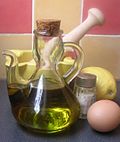Emulsion
Emulsion is a mixture of two or more liquids that are normally immiscible (unmixable or unblendable). Emulsions are part of a more general class of two-phase systems of matter called colloids. Although the terms colloid and emulsion are sometimes used interchangeably, emulsion should be used when both phases, dispersed and continuous, are liquids. In an emulsion, one liquid (the dispersed phase) is dispersed in the other (the continuous phase). Examples of emulsions include vinaigrettes, milk, and some cutting fluids for metal working.
The process of turning a liquid mixture into an emulsion is called emulsification. Emulsions are stabilized by adding an emulsifier or emulsifying agents. Emulsifiers are substances that are soluble in both fat and water and enable fat to be uniformly dispersed in water as an emulsion. Examples of food emulsifiers are egg yolk (where the main emulsifying agent is lecithin), and mustard. The emulsifying agent in human digestive tracts is bile, produced in the liver and secreted into the digestive tract.
Types of Emulsions[edit]
Emulsions can be classified into two major types depending on the nature of the emulsifier and the phase volume ratio: oil-in-water (O/W) and water-in-oil (W/O). In oil-in-water emulsions, oil is the dispersed phase and water is the continuous phase. Milk is an example of an oil-in-water emulsion, with fat globules dispersed in a water-based solution. Conversely, in water-in-oil emulsions, water is the dispersed phase and oil is the continuous phase. Butter and mayonnaise are examples of water-in-oil emulsions.
Formation and Stabilization[edit]
The formation of an emulsion requires energy to overcome the natural repulsion between the liquid phases. This energy can be provided by shaking, stirring, or homogenizing. Once formed, emulsions can break down over time, a process known as demulsification. To prevent this, emulsifiers are added to stabilize the emulsion. Emulsifiers work by forming a physical barrier around the dispersed droplets, preventing them from coalescing. Common emulsifiers include surfactants, proteins, and polysaccharides.
Applications[edit]
Emulsions are used in various industrial and medical applications. In the pharmaceutical industry, emulsions are used for the controlled delivery of certain drugs. In the food industry, emulsions are essential for the texture and taste of many products. Emulsions are also used in cosmetics, such as creams and lotions, where they help to blend oil and water-based components. In the oil industry, emulsions are used in the form of drilling fluids, and in environmental management, they play a role in the cleanup of oil spills.
See Also[edit]
References[edit]
<references/>
| This article is a stub. You can help WikiMD by registering to expand it. |
-
Diagram illustrating the concept of emulsions.
-
Ingredients used in making mayonnaise.
Ad. Transform your life with W8MD's Budget GLP-1 injections from $49.99


W8MD offers a medical weight loss program to lose weight in Philadelphia. Our physician-supervised medical weight loss provides:
- Weight loss injections in NYC (generic and brand names):
- Zepbound / Mounjaro, Wegovy / Ozempic, Saxenda
- Most insurances accepted or discounted self-pay rates. We will obtain insurance prior authorizations if needed.
- Generic GLP1 weight loss injections from $49.99 for the starting dose of Semaglutide and $65.00 for Tirzepatide.
- Also offer prescription weight loss medications including Phentermine, Qsymia, Diethylpropion, Contrave etc.
NYC weight loss doctor appointmentsNYC weight loss doctor appointments
Start your NYC weight loss journey today at our NYC medical weight loss and Philadelphia medical weight loss clinics.
- Call 718-946-5500 to lose weight in NYC or for medical weight loss in Philadelphia 215-676-2334.
- Tags:NYC medical weight loss, Philadelphia lose weight Zepbound NYC, Budget GLP1 weight loss injections, Wegovy Philadelphia, Wegovy NYC, Philadelphia medical weight loss, Brookly weight loss and Wegovy NYC
|
WikiMD's Wellness Encyclopedia |
| Let Food Be Thy Medicine Medicine Thy Food - Hippocrates |
Medical Disclaimer: WikiMD is not a substitute for professional medical advice. The information on WikiMD is provided as an information resource only, may be incorrect, outdated or misleading, and is not to be used or relied on for any diagnostic or treatment purposes. Please consult your health care provider before making any healthcare decisions or for guidance about a specific medical condition. WikiMD expressly disclaims responsibility, and shall have no liability, for any damages, loss, injury, or liability whatsoever suffered as a result of your reliance on the information contained in this site. By visiting this site you agree to the foregoing terms and conditions, which may from time to time be changed or supplemented by WikiMD. If you do not agree to the foregoing terms and conditions, you should not enter or use this site. See full disclaimer.
Credits:Most images are courtesy of Wikimedia commons, and templates, categories Wikipedia, licensed under CC BY SA or similar.
Translate this page: - East Asian
中文,
日本,
한국어,
South Asian
हिन्दी,
தமிழ்,
తెలుగు,
Urdu,
ಕನ್ನಡ,
Southeast Asian
Indonesian,
Vietnamese,
Thai,
မြန်မာဘာသာ,
বাংলা
European
español,
Deutsch,
français,
Greek,
português do Brasil,
polski,
română,
русский,
Nederlands,
norsk,
svenska,
suomi,
Italian
Middle Eastern & African
عربى,
Turkish,
Persian,
Hebrew,
Afrikaans,
isiZulu,
Kiswahili,
Other
Bulgarian,
Hungarian,
Czech,
Swedish,
മലയാളം,
मराठी,
ਪੰਜਾਬੀ,
ગુજરાતી,
Portuguese,
Ukrainian
